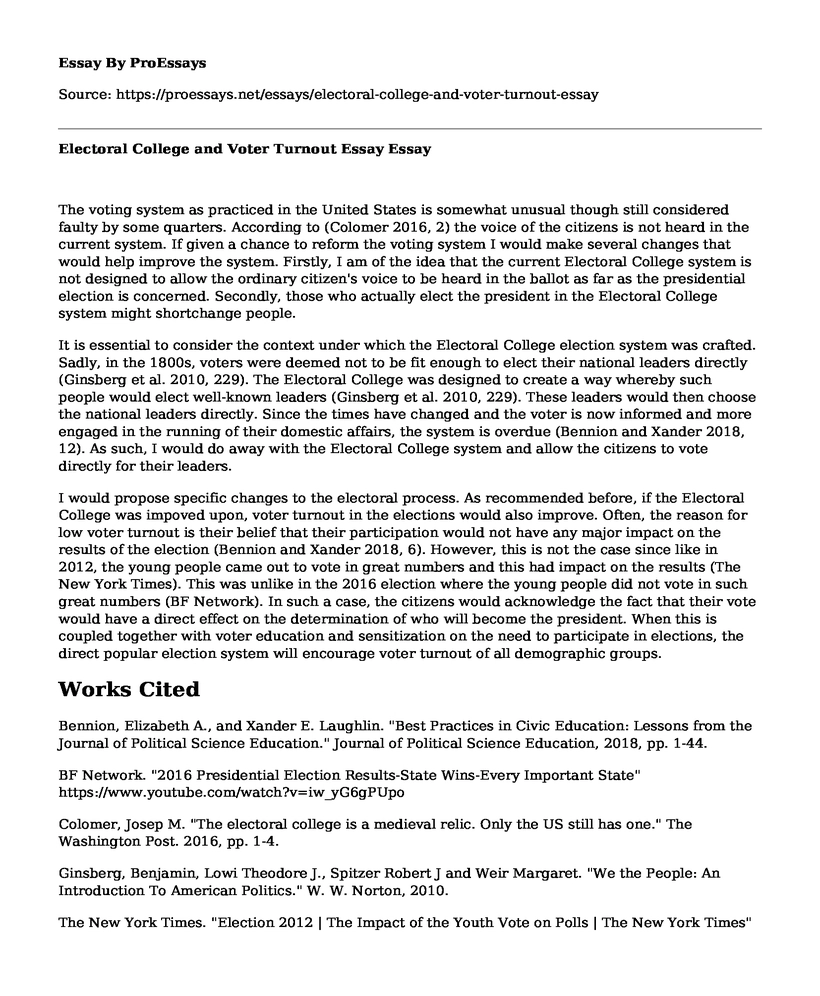The voting system as practiced in the United States is somewhat unusual though still considered faulty by some quarters. According to (Colomer 2016, 2) the voice of the citizens is not heard in the current system. If given a chance to reform the voting system I would make several changes that would help improve the system. Firstly, I am of the idea that the current Electoral College system is not designed to allow the ordinary citizen's voice to be heard in the ballot as far as the presidential election is concerned. Secondly, those who actually elect the president in the Electoral College system might shortchange people.
It is essential to consider the context under which the Electoral College election system was crafted. Sadly, in the 1800s, voters were deemed not to be fit enough to elect their national leaders directly (Ginsberg et al. 2010, 229). The Electoral College was designed to create a way whereby such people would elect well-known leaders (Ginsberg et al. 2010, 229). These leaders would then choose the national leaders directly. Since the times have changed and the voter is now informed and more engaged in the running of their domestic affairs, the system is overdue (Bennion and Xander 2018, 12). As such, I would do away with the Electoral College system and allow the citizens to vote directly for their leaders.
I would propose specific changes to the electoral process. As recommended before, if the Electoral College was impoved upon, voter turnout in the elections would also improve. Often, the reason for low voter turnout is their belief that their participation would not have any major impact on the results of the election (Bennion and Xander 2018, 6). However, this is not the case since like in 2012, the young people came out to vote in great numbers and this had impact on the results (The New York Times). This was unlike in the 2016 election where the young people did not vote in such great numbers (BF Network). In such a case, the citizens would acknowledge the fact that their vote would have a direct effect on the determination of who will become the president. When this is coupled together with voter education and sensitization on the need to participate in elections, the direct popular election system will encourage voter turnout of all demographic groups.
Works Cited
Bennion, Elizabeth A., and Xander E. Laughlin. "Best Practices in Civic Education: Lessons from the Journal of Political Science Education." Journal of Political Science Education, 2018, pp. 1-44.
BF Network. "2016 Presidential Election Results-State Wins-Every Important State" https://www.youtube.com/watch?v=iw_yG6gPUpo
Colomer, Josep M. "The electoral college is a medieval relic. Only the US still has one." The Washington Post. 2016, pp. 1-4.
Ginsberg, Benjamin, Lowi Theodore J., Spitzer Robert J and Weir Margaret. "We the People: An Introduction To American Politics." W. W. Norton, 2010.
The New York Times. "Election 2012 | The Impact of the Youth Vote on Polls | The New York Times" https://www.youtube.com/watch?v=PDFyL_T_ORo
Cite this page
Electoral College and Voter Turnout Essay. (2022, Mar 29). Retrieved from https://proessays.net/essays/electoral-college-and-voter-turnout-essay
If you are the original author of this essay and no longer wish to have it published on the ProEssays website, please click below to request its removal:
- American Policies and Actions 1945-1975 Essay
- Essay Sample on Developing a Democracy
- E-commerce Impact on Logistics and Government Shutdown Essays edxample
- Essay Sample on Free Enterprise System: US Market Policies & Systems
- Essay on State's Role in Economic Development: Neo-Liberalization & Globalization
- Essay Example on 2008: Obama Busts Into US Presidential Politics
- Addressing Consumer Privacy: Governments and Businesses Working Together - Essay Sample







